#li xinzhe
Explore tagged Tumblr posts
Text
Journey to the West: Marble Mountains (2022) 大梦西游之五行山
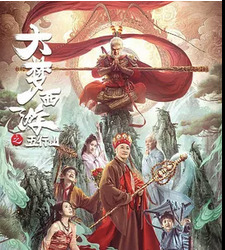
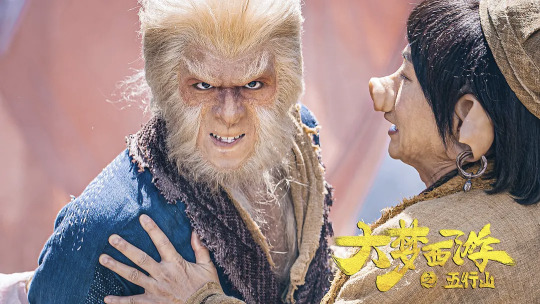
Director: Jin Lijun
Screenwriter: Zhou Fengping
Starring: Chen Xinzhe / Fu Mengni / Chi Chongrui / Li Yaoxiang / Li Liqun / Zhang Xiyuan / Deng Limin / Chen Sanmu
Gene: Costume
Country/Region of Production: Mainland China
Language: Mandarin Chinese
Date: 2022-09-23 (Mainland China)
Duration: 95 minutes
Also known as: Marble Mountains / Dream Journey to the West / Great Dream Journey to the West: Five Elements Mountains
Type: Retelling
Summary:
Wukong (played by Chen Xinzhe) fought against Tathagata, and Tathagata took Wukong under the Five Elements Mountain with one palm, and photographed the 500-year time gap in Journey to the West. For the past 500 years, Wukong has been waiting for the arrival of the Buddhist monk Tang Seng (played by Chi Chongrui). Taibai Jinxing brought him a Yuanshen bead, claiming that as long as the bead was sent to Fangcun Mountain in Lingtai, he could regain his freedom. Wukong was ordered to go out of the mountain in order to be free. Along the way, he and the curious and brave Tianwei (played by Dong Jiuhe) rescued the intellectual and innocent Huayin Fairy (played by Fu Mengni). The three have gone through hardships and find their heart all the way. They encountered A Cui (played by Zhang Xiyuan) who is married to Zhu Bajie (played by Li Yaoxiang), a rolling shutter general who was demoted to harm one side, and the demon king Shiyuan who covets the Yuanshen bead. How does Wukong, Bajie, and Wujing, team up to fight the demon? Will the demon king Shiyuan's dream of seizing the Yuanshen bead to dominate the world come true? Watch the legend of master and apprentice come out of the mountain, and explore the five hundred years of Journey to the West that disappeared!
Source: https://mov-20.chinesemov.com/2022/Dream-Journey-to-the-West
Link: https://everecooil.com/shubo/95639-3-1.html
#Journey to the West: Marble Mountains#大梦西游之五行山#Marble Mountains#Dream Journey to the West#Great Dream Journey to the West: Five Elements Mountains#jttw media#jttw movie#movie#live action#Retelling#addition#sun wukong#zhu bajie#sha wujing#Tang Sanzang#subodhi#monk tripitaka
7 notes
·
View notes
Text
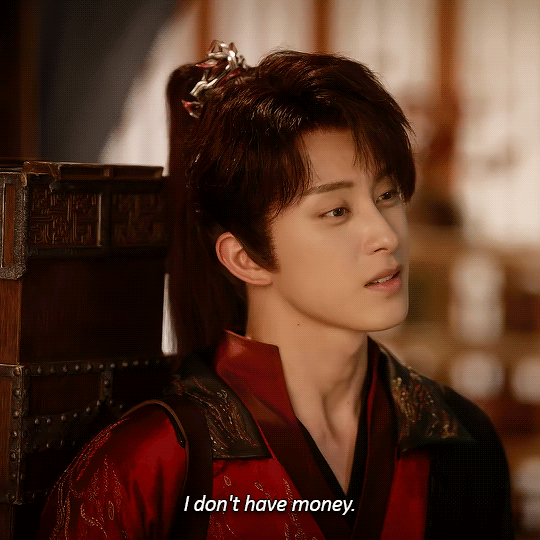
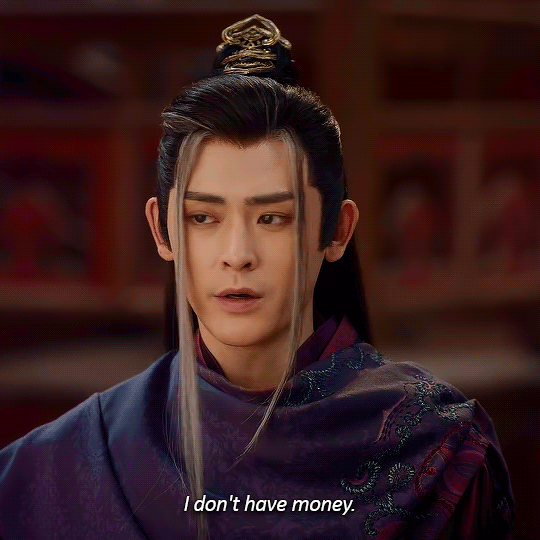

The Blood of Youth EP01 | Journey of Broke Teenagers
#cdrama#少年歌行#blood of youth#the blood of youth#shao nian ge xing#ao ruipeng#lei wujie#li xinzhe#tang lian#li hongyi#xiao se#gif#/#they may have no money#but lei wujie has a heart of gold#tang lian a coffin of gold#and xiao se... well its too much to list here djhfgsf#i tried something with the colouring for once and it turned out alright imho~
903 notes
·
View notes
Text
A Guide to Taiwanese Name Romanization
Have you ever wondered why there are so many Changs when the surname 常 is not actually that common? Have you ever struggled to figure out what sound “hs” is? Well don’t worry! Today we are going to go over some common practices in transliterating names from Taiwan.
With some recent discussion I’ve seen about writing names from the Shang-Chi movie, I thought this was the perfect time to publishe this post. Please note that this information has been compiled from my observations--I’m sure it’s not completely extensive. And if you see any errors, please let me know!
According to Wikipedia, “the romanized name for most locations, persons and other proper nouns in Taiwan is based on the Wade–Giles derived romanized form, for example Kaohsiung, the Matsu Islands and Chiang Ching-kuo.” Wade-Giles differs from pinyin quite a bit, and to make things even more complicated, transliterated names don’t necessarily follow exact Wade-Giles conventions.
Well, Wikipedia mentioned Kaohsiung, so let’s start with some large cities you already know of!
[1] B → P 台北 Taibei → Taipei [2] G → K [3] D → T In pinyin, we have the “b”, “g”, and “d” set (voiceless, unaspirated) and the “p”, “k”, and “t” set (voiceless, aspirated). But in Wade-Giles, these sets of sounds are distinguished by using a following apostrophe for the aspirated sounds. However, in real life the apostrophe is often not used.
We need some more conventions to understand Kaohsiung. [4] ong → ung (sometimes) [5] X → Hs or Sh 高雄 Gaoxiong → Kaohsiung I wrote “sometimes” for rule #4 because I am pretty sure I have seen instances where it is not followed. This could be due to personal preference, historical reasons, or influence from other romanization styles.
Now some names you are equipped to read: 王心凌 Wang Xinling → Wang Hsin-ling 徐熙娣 Xu Xidi → Shu/Hsu Hsi-ti (I have seen both) 黄鸿升 Huang Hongsheng → Huang Hung-sheng 龙应台 Long Yingtai → Lung Ying-tai 宋芸樺 Song Yunhua → Sung Yun-hua
You might have learned pinyin “x” along with its friends “j” and “q”, so let’s look at them more closely. [6] J → Ch [7] Q → Ch 范玮琪 Fan Weiqi → Fan Wei-chi 江美琪 Jiang Meiqi → Chiang Mei-chi 郭静 Guo Jing → Kuo Ching 邓丽君 Deng Lijun → Teng Li-chun This is similar to the case for the first few conventions, where an apostrophe would distinguish the unaspirated sound (pinyin “j”) from the aspirated sound (pinyin “q”). But in practice these ultimately both end up as “ch”. I have some disappointing news.
[8] Zh → Ch Once again, the “zh” sound is the unaspirated correspondent of the “ch” sound. That’s right, the pinyin “zh”, “j”, and “q” sounds all end up being written as “ch”. This can lead to some...confusion. 卓文萱 Zhuo Wenxuan → Chuo Wen-hsuan 陈绮贞 Chen Qizhen → Chen Chi-chen 张信哲 Zhang Xinzhe → Chang Shin-che At least now you finally know where there are so many Changs. Chances are, if you meet a Chang, their surname is actually 张, not 常.
Time for our next set of rules. [10] C → Ts [11] Z → Ts [12] Si → Szu [13] Ci, Zi → Tzu Again we have the situation where “c” is aspirated and “z” is unaspirated, so the sounds end up being written the same. 曾沛慈 Zeng Peici → Tseng Pei-tzu 侯佩岑 Hou Peicen → Hou Pei-tsen 周子瑜 Zhou Ziyu → Chou Tzu-yu 黄路梓茵 Huang Lu Ziyin → Huang Lu Tzu-yin 王思平 Wang Siping → Wang Szu-ping
Fortunately this next convention can help clear up some of the confusion from above. [14] i → ih (zhi, chi, shi) [15] e → eh (-ie, ye, -ue, yue) Sometimes an “h” will be added at the end. So this could help distinguish some sounds. Like you have qi → chi vs. zhi → chih. There could be other instances of adding “h”--these are just the ones I was able to identify. 曾之乔 Zeng Zhiqiao → Tseng Chih-chiao 施柏宇 Shi Boyu → Shih Po-yu 谢金燕 Xie Jinyan → Hsieh Jin-yan 叶舒华 Ye Shuhua → Yeh Shu-hua 吕雪凤 Lü Xuefeng → Lü Hsueh-feng
Continuing on, a lot of the conventions below are not as consistently used in my experience, so keep that in mind. Nevertheless, it is useful to be familiar with these conventions when you do encounter them.
[16] R → J (sometimes) Seeing “j” instead of “r” definitely confused me at first. Sometimes names will still use “r” though, so I guess it is up to one’s personal preferences. 任贤齐 Ren Xianqi → Jen Hsien-chi 任家萱 Ren Jiaxuan → Jen Chia-hsüan 张轩睿 Zhang Xuanrui → Chang Hsuan-jui
[17] e → o (ke, he, ge) I can see how it would easily lead to confusion between ke-kou, ge-gou, and he-hou, so it’s important to know. I’ve never seen this convention for pinyin syllables like “te” or “se” personally. 柯震东 Ke Zhendong → Ko Chen-tung 葛仲珊 Ge Zhongshan→ Ko Chung-shan
[18] ian → ien [19] Yan → Yen I’ve observed that rule 18 seems more common than 19 because I see “yan” used instead of “yen” a fair amount. I’m not really sure why this is. 柯佳嬿 Ke Jiayan → Ko Chia-yen 田馥甄 Tian Fuzhen → Tien Fu-chen 陈建州 Chen Jianzhou → Chen Chien-chou 吴宗宪 Wu Zongxian → Wu Tsung-hsien
[20] Yi → I (sometimes) I have seen this convention not followed pretty frequently, but two very famous names are often in line with it. 蔡英文 Cai Yingwen → Tsai Ing-wen 蔡依林 Cai Yilin → Tsai I-lin
[21] ui → uei I have seen this convention used a couple times, but “ui” seems to be much more common. 蔡立慧 Cai Lihui → Tsai Li-huei
[22] hua → hwa This is yet another convention that I don’t always see followed. But I know “hwa” is often used for 华 as in 中华, so it’s important to know. 霍建华 Huo Jianhua → Huo Chien-hwa
[23] uo → o This is another example of where one might get confused between the syllables luo vs. lou or ruo vs. rou. So be careful! 罗志祥 Luo Zhixiang → Lo Chih-hsiang 刘若英 Liu Ruoying → Liu Jo-ying 徐若瑄 Xu Ruoxuan → Hsu Jo-hsuan
[24] eng → ong (feng, meng) I think this rule is kinda cute because some people with Taiwanese accents pronounce meng and feng more like mong and fong :) 权怡凤 Quan Yifeng → Quan Yi-fong
[25] Qing → Tsing I am not familiar with the reasoning behind this spelling, but 国立清华大学 in English is National Tsing Hua University, so this spelling definitely has precedence. But I also see Ching too for this syllable. 吴青峰 Wu Qingfeng→ Wu Tsing-fong
[26] Li → Lee Nowadays a Chinese person from the Mainland would probably using the Li spelling, but in other areas, Lee remains more common. 李千那 Li Qianna → Lee Chien-na
[27] Qi → Chyi I have noticed this exception. However, I’ve only personally noticed it for this surname, so maybe it’s just a convention for 齐. 齐秦 Qi Qin → Chyi Chin 齐豫 Qi Yu → Chyi Yu
[28] in ←→ ing In Taiwanese Mandarin, these sounds can be merged, so sometimes I have noticed ling and lin, ping and pin, etc. being used in place of each other. I don’t know this for sure, but I suspect this is why singer A-Lin is not A-Ling (her Chinese name is 黄丽玲/Huang Liling).
[29] you → yu I personally haven’t noticed these with other syllables ending in “ou,” only with the “you” syllable. 刘冠佑 Liu Guanyou → Liu Kuan-yu 曹佑宁 Cao Youning → Tsao Yu-ning
There is a lot of variation with these transliterated names. There are generally exceptions galore, so keep in mind that all this is general! Everyone has their own personal preferences. If you just look up some famous Taiwanese politicians, you will see a million spellings that don’t fit the 28 conventions above. Sometimes people might even mix Mandarin and another Chinese language while transliterating their name.
Anyway, if any of you know why 李安 is romanized as Ang Lee, please let me know because it’s driving me crazy.
Note: The romanized names I looked while writing this post at were split between two formats, capitalizing the syllable after the hyphen and not capitalizing this syllable. I chose to not capitalize for all the names for the sake of consistency. I’m guessing it’s a matter of preference.
#romanization#transliteration#taiwan#chinese name#chinese names#cross-strait chinese#chinese#mandarin#chinese language#mandarin chinese#langblr#studyblr#langblog#language learning#language stuff#language study#language#languages#language lover#chinese langblr#chinese studyblr#mandarin langblr#mandarin studyblr#learn chinese#learn mandarin#learning chinese#learning mandarin#study chinese#study mandarin#studying chinese
272 notes
·
View notes
Text
Eric Chou
Zhou Xingzhe 周興哲
Birthday: June 22, 1995
Height: 182cm
Signed to Song Music Taiwan
Debuted in 2014
Lived in Boston for several years as a teenager
Older brother Alex Chou (Zhou Yutian 周予天) is also a singer-songwriter
Social media
Facebook Instagram Weibo Youtube
Where to listen
iTunes Pandora Spotify
Music
2014 學著愛 (My Way To Love)
學著愛
以後別做朋友
在你耳邊說
跟鋼琴說話
怎麼好意思
愛情導演
愛在聖誕 (feat Rosie.楊凱琳)
會飛的想念
音樂快門
再愛你
Come Out Your Way
學著愛 (私藏鋼琴版)
2016 What Love Has Taught Us (愛,教會我們的事) [album highlight medley]
負一分鐘
Let It Go
明明
你,好不好?
This Is Love
No One Like You
我愛的那種
愛情教會我們的事
認定
想回到那一天
2017 如果雨之後 (The Chaos After You)
Without Her
如果雨之後
永不失聯的愛 (Never Lose Love)
快樂一次擁有(Happiness at Once)
同義詞 (Lies)
黏黏 (The Way You Make Me Feel)
我知道要微笑(Smile With a Broken Heart)
易��品
Another You
I See You Everywhere
Singles/collabs/OSTs
2016 你,好不好? [遺憾拼圖 OST (Life List OST)]
2016 給牠一個家
2016 我愛過你 (One Minute Minus) [左耳 OST (Left Ear OST)]
2017 永不失聯的愛(原創概念版) (Never Lose Love (original concept version)) [小妖的金色城堡 OST (Golden Castle of the Little Devil OST)]
2017 愛在身邊 (Unbreakable Love) [愛在你聲邊 OST]
Songwriting credits
2014 胡夏 (Hu Xia) - 你在哪裡 (Where are you) [16個夏天 OST]
2015 張陽陽 (Zhang Yangyang) - 轉眼不見 (Invisible) [轉眼不見 (Unseen)]
2016 AC周予天 (Zhou Yutian) - 我以為 (I Love You So) [奇妙的時光之旅 OST (Magical Space-Time OST)]
2016 A-Lin - 幸福太短 (Happiness Too Short) [奇妙的時光之旅 OST (Magical Space-Time OST)]
2016 艾怡良 (Ai Yiliang/Eve Ai) - 說 (Say) [艾怡良 (Ai Yiliang self-titled album)]
2016 張瑋 (Zhang Wei) - 求愛歌 (Courtship Song) [從新定瑋 (From the New Ding)]
2017 張信哲 (Zhang Xinzhe/Jeff Chang) - 遷徙 (Migration) [遷徙 (Migration)]
2017 林欣甫 (Lin Xinyu/Max Lin) - 兩個人寂寞 (Two People are Lonely) [克隆太陽 (Cloning the Sun)]
2017 A-Lin - 無人知曉的我 (The Unknown Me) [A-Lin self-titled album]
2017 齐秦 (Qi Qin) - 乖 (Be Good)
2017 齐秦 (Qi Qin) - 可惜了 (Too Bad)
2018 吳思賢 (Wu Sixian) - 到不了的以後 (After Not Coming) [姊的時代 OST (Iron Ladies OST)]
2018 王博文 (Wang Bowen) - 你有沒有想過我 (Have You Ever Thought About Me) [食光機 OST (Eating Machine)]
Covers
Jay Chou - (...i have no idea what song this is right now)
Justin Beiber - Heartbreaker
John Mayer - Gravity
Meghan Trainor feat. John Legend - Like I’m Gonna Lose You
TV/Film
Series
2014 The Way We Were (16個夏天) cameo
2017 Little Demon of Golden Castle (小妖的金色城堡)
Film
2016 Love, Meet Again (又見麵,幸福的味道) (short film)
Sources
https://en.wikipedia.org/wiki/Eric_Chou
https://zh.wikipedia.org/wiki/%E5%91%A8%E8%88%88%E5%93%B2
https://baike.baidu.com/item/%E5%91%A8%E5%85%B4%E5%93%B2
https://zh.wikipedia.org/wiki/%E5%A5%87%E5%A6%99%E7%9A%84%E6%99%82%E5%85%89%E4%B9%8B%E6%97%85
7 notes
·
View notes
Text
Marshal Canopy Returns (2018) 西游之天蓬归来
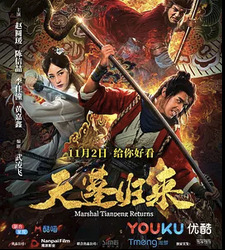
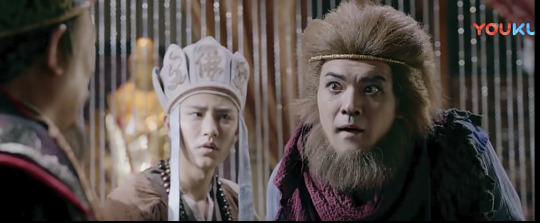
Director: Fang Xiaogang
Screenwriter: Wu Lingfei
Starring: Zhao Yuanyuan / Chen Xinzhe / Huang Jiaxin / Li Jiatong
Genre: Comedy / Romance / Fantasy / Costume
Country/Region of Production: Mainland China
Language: Mandarin Chinese
Date: 2018-10-30 (Mainland China)
Duration: 100 minutes
Also known as: Journey to the West: Return of the Canopy
Type: Retelling
Summary:
The film tells the story of Gao Cuilan, in order to comply with the orders of her parents, she cooperated in organizing a marriage recruitment conference. But everything went wrong, not only did she not get married, but she became the laughing stock of Gao Laozhuang. Mr. Gao tried his best to direct and act as the king of the mountain to snatch the marriage. On the road, she encountered Zhu Gangman by accident, and he sent Gao Cuilan back to the Gao’s house by mistake. Afterwards, a series of love-hate entanglements occurred between Gao Cuilan and Zhu Gangman. In the end, Tang Seng and others "conquered" him as a disciple in Gao Laozhuang, and went to the West to learn Buddhist scriptures together.
Source: https://chinesemov.com/2018/Marshal-Canopy-Returns
Link: https://youtu.be/9ioLottTuQk
#Marshal Canopy Returns#西游之天蓬归来#天蓬归来#jttw media#jttw#jttw movie#movie#live action#retelling#zhu bajie centered#zhu bajie#sun wukong#Gao Cuilan#Tang Sanzang#monk tripitaka#Jade Rabbit#Black Wind Demon#Yellow Wind Demon#lady gao#gaunyin#White Face Man#Scholar#rewrite
4 notes
·
View notes